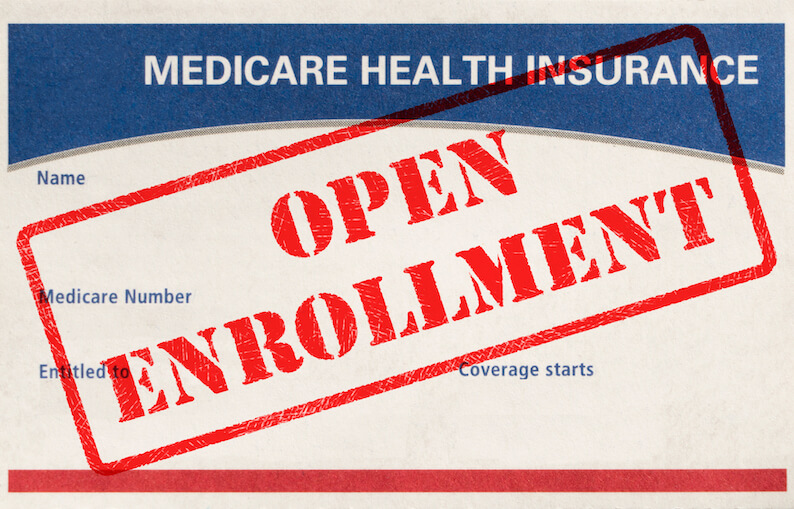The Basics Of Medicare
Medicare is a federally run health plan program that is comprised of four parts.
Hospital Insurance, Part A
- Hospital Stays
- Skilled Nursing Care
- Hospice
- Home Health Services
Medical Insurance, Part B
- Doctor Visits
- Surgery
- Lab Tests
- Medical Equipment
Medicare Advantage, Part C
- Same Benefits as Part A and B
- Prescription Drug Coverage
- Dental, Vision, and Hearing Services
- Health and Wellness Programs
Drug Coverage, Part D
- Prescription Drugs
How Each Part Works
Parts A and B together are what is referred to as Original Medicare. The federal government administers these. Part C is called Medicare Advantage. It includes both Parts A and B, in addition to some form of Part D. Medicare Advantage is offered through private insurance companies and may also include other value-based benefits not covered by Original Medicare, such as hearing, vision, and dental.
Among the Medicare options is also supplement plans known as Medigap insurance coverage. These, like Medicare Advantage, are offered by private insurance companies. Medigap plans are available to those individuals with Original Medicare who would like to receive additional help covering some of the healthcare costs that Original Medicare does not.
Medicare Advantage and Medigap services all vary by individual plans.
Who Qualifies For Medicare?
In general, people who are age 65 and older, have permanent kidney disease that requires dialysis or a transplant, or are younger than 65 but have disabilities are eligible for Medicare, according to the Department of Health & Human Services.
Additionally, you don’t have to pay a premium for Part A if you are at least 65 and you or your spouse worked and paid Medicare taxes for at least 10 years. The following conditions also entitle someone who is over 65 to Part A without having to pay a premium:
- Those receiving Social Security or Railroad Retirement Board benefits.
- Being eligible for those benefits but have not yet filed to receive them.
- You or your spouse were employed by a government department that was covered by Medicare.
If you aren’t 65 yet, you may still qualify for Part A without paying premiums if you have qualified for Social Security or Railroad Retirement Board disability benefits for 24 months or if you are a kidney dialysis or transplant patient.

What is the Medicare Annual Enrollment Period?
The Annual Enrollment Period (AEP) is a period that runs from October 15 through December 7. During this time, all Medicare beneficiaries can make changes to their healthcare benefits. All changes take effect on January 1 of the following year.
Other Medicare enrollment periods include:
- Initial Enrollment Period (IEP)
This period runs for seven months. It begins three months before the month you turn 65, includes the month of your birthday, and continues for three months after your birth month. During that time, you can sign up for a Medicare Advantage plan (Part C) or Medicare Drug Plan (Part D).
- General Enrollment Period
During this time, if you have Part A and get Part B, you’re also allowed to join a Medicare Advantage or Medicare drug plan. The drawback is your coverage may not start until July 1.
- Open Enrollment Period (OEP)
The Medicare Open Enrollment period runs from January 1 – March 31. This period allows people who are already enrolled in a Medicare Advantage Plan to change to another Medicare Advantage Plan or change back to Original Medicare.
The Medicare Open Enrollment Period does not allow for beneficiaries to switch from Original Medicare to Medicare Advantage or add or change a drug plan if they’re on Original Medicare.
- Special Enrollment Period
If you move to a new location or lose your insurance coverage, you may qualify for a Special Enrollment Period. The rules for this will vary from case to case. The government’s Medicare website addresses each situation and what changes you are allowed to make.
How Much Does Medicare Cost?
Part A of Original Medicare is free if you have worked and paid Social Security taxes for at least 10 years. Part B coverage does have a monthly premium and deductible. The federal program sets a standard monthly premium for Part A and Part B each year. Individual premiums can vary based on income. Medicare also offers low-income subsidy programs for those who are in need of assistance.
Medicare Advantage costs can vary greatly depending on insurance companies. Several Medicare Advantage plans offer $0 monthly premiums making coverage more affordable than ever.
Tips for Navigating Medicare Annual Enrollment Period
We want to help you get the best coverage for your specific needs, so here are some tips to help guide you through the Medicare enrollment process. By following these tips, you can navigate the annual enrollment with confidence and find the coverage that best meets your healthcare needs.
Tip #1 Review Your Current Coverage
First and foremost, take the time to review your current healthcare coverage and assess any changes or limitations you may have experienced over the past year. As we previously said, your health can change significantly in a year. Assessing your current health status will help you identify areas where additional coverage may be needed, such as increased Part D prescription drug needs or greater access to specialist care.
Tip #2 Explore Plan Options
Research the various Medicare plans available in your area. Look at the costs associated with each plan, including premiums, deductibles, and copays. Additionally, consider the network of doctors and hospitals associated with each plan to ensure your preferred providers are included. Providers change the insurance they accept all the time, so it’s important to double-check this, even if your provider has been in-network for years with your current insurance. Note: VIPcare accepts most Medicare plans and insurance in your area, and switching providers is quick and hassle-free.
Tip #3 Seek Assistance if Needed
Don’t forget to take advantage of any available resources, such as the Medicare Plan Finder tool, which can help you compare plans and estimate costs. Additionally, consider consulting with a licensed insurance agent or healthcare provider who can provide personalized guidance based on your unique needs and preferences. Note: If you do not have an insurance agent, contact VIPcare, and we can put you in touch with one of our preferred independent Medicare Benefits advisors.
Tip #4 Don’t Miss the Deadline
Be sure to mark important dates on your calendar, such as the start and end of the enrollment period, to ensure that you don’t miss any deadlines or opportunities to make changes to your coverage. AEP runs from October 15 through December 7.

How Caregivers Can Assist Seniors During the AEP
Caregivers play an essential role in helping seniors navigate the often confusing process of selecting the right Medicare coverage during the Annual Enrollment Period. Here’s how caregivers can provide valuable support:
Research Plan Options: Caregivers can help seniors explore various Medicare plans, including Medicare Advantage, Medigap, and Part D prescription drug plans. They can assist in comparing premiums, deductibles, and co-pays to find a plan that fits the senior’s evolving healthcare and financial needs. This ensures that seniors choose a plan that covers their required medications, treatments, and preferred providers.
Organize Important Documents: Keeping track of paperwork such as Medicare cards, past medical bills, prescriptions, and previous insurance statements is crucial. Caregivers can assist seniors in gathering and organizing these documents, making the enrollment process smoother and less overwhelming.
Provide Emotional Support: Navigating healthcare choices can be stressful, especially when multiple options and deadlines are involved. Caregivers can offer emotional support, helping seniors feel more confident in their decisions and less anxious about the process.
Assist in Meeting Deadlines: A caregiver can also serve as a reminder to ensure that seniors don’t miss crucial dates during the Medicare Annual Enrollment Period, which runs from October 15 to December 7.
By offering guidance, support, and timely reminders, caregivers can help seniors confidently navigate the Medicare Annual Enrollment Period and secure the best healthcare coverage for their needs.
Don’t Wait. Explore Your Options Today!
Your health and well-being are of the utmost importance. Securing the right Medicare coverage ensures that you have access to the medical care you need. Don’t wait until it’s too late, or you’re having to be rushed to select a plan. Instead, start considering your options now so you’re ready when the Annual Enrollment Period begins on October 15.
VIPcare – Doctors Who Care with Experience You Can Trust
Changing to a VIPcare provider is easy and hassle-free. We accept most insurance plans in your area. And as a VIPcare patient, you will receive nothing but a 5-star experience. With a mission of Better Health, we focus on prevention and maintenance to get our patients healthy and keep them healthy.
Our doctors spend the necessary time with each and every patient in order to get to know them and their specific healthcare needs. No two patients are the same or have the same needs, so they shouldn’t be cared for the same. VIPcare takes a specialized approach when caring for patients. At VIPcare, you truly get the VIP experience. Less time in the waiting room. More time with your doctor. It’s time for Better Health! Call 866-926-3831 to learn more!



